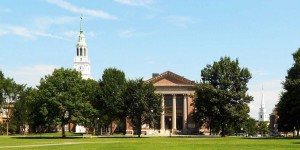Increasingly, it seems as though there is not one topic that the Dartmouth student body can collectively agree upon. Perhaps the only unifying factor is the decision to spend their four years of college at Dartmouth. As Daniel Webster once said, “It is, Sir, as I have said, a small College, and yet, there are those who love it.” Dartmouth has long been characterized by a relatively small and tight-knit student body; indeed, this facet of the Dartmouth Experience could even qualify as one of the College’s oft-cited traditions. Yet a recent editorial in The Dartmouth attacks these traditions, citing the convenient bogeymen of “institutionalized ills.”
The editorial’s author discounts campus climate as a major factor in College admissions. However, college admissions is not a game to be taken lightly; in truth, it is probably the most important decision a student has made at that point in his life. This is why it is important that one considers all aspects and possibilities regarding a certain school. From location to academic record to affordability, each of these aspects is critical in deciding where to live and learn for the next four years of one’s life. Campus climate is one of these aspects; perhaps it is not the single most defining aspect, but it also cannot be written off.
One would be hard-pressed to find a tradition at this school which actively seeks to oppress or demean minority groups. The logic in the editorial’s argument simply breaks down when one looks at the general inclusivity of the plethora of student groups and organizations open to all students and dedicated to many different causes; the College’s Greek system stands as a prominent example of such inclusivity. Indeed, the consensus of the majority happens to be part of the very definition of democracy. Finally, the analogy of the black man subject to racism at his place of employment fails to accurately convey the situation at hand. What would be more accurate would be a man hired at a large and old corporation who, when upset by a few aspects of the business, attempts to drastically alter the system which has worked for so many individuals (of many different backgrounds) in the past.
It is clear that Dartmouth has its own unique culture as a school. We have our storied Greek system, our century-old tradition of Winter Carnival, and so many other unique opportunities. Few would want another student at this school to fall by the wayside and fail to have that Dartmouth Experience so often hailed. It is one thing, however, to challenge an experience so beloved to many and expect “justice” in its place. Perhaps it might be a better option to take a step back and appreciate the many things that Dartmouth provides its students, from speeches by renowned politicians to world-class faculty to strong financial assistance. Some traditions are better off living on.


Be the first to comment on "A Defense of Tradition"